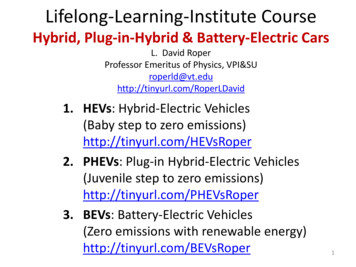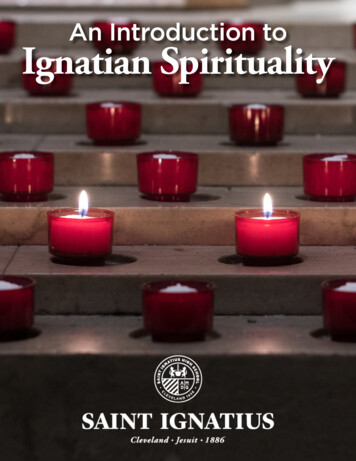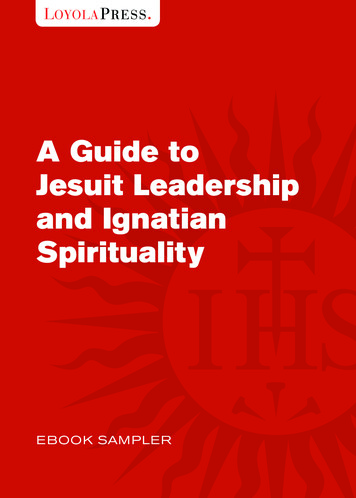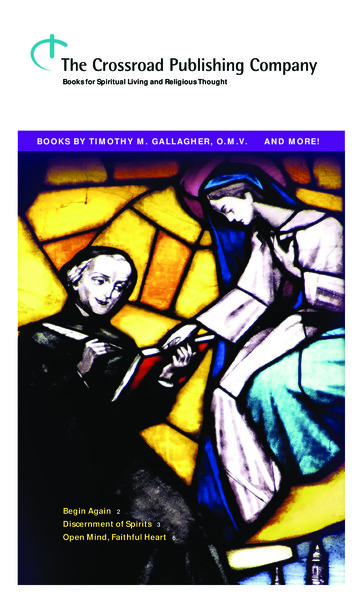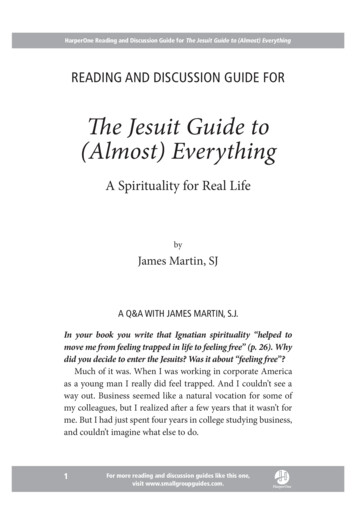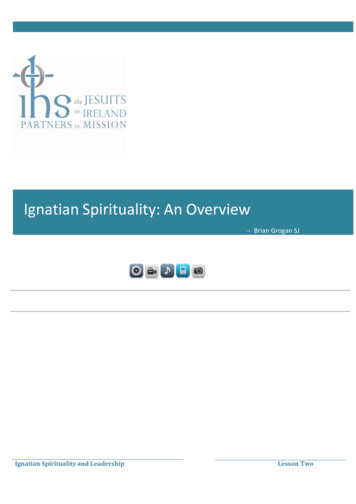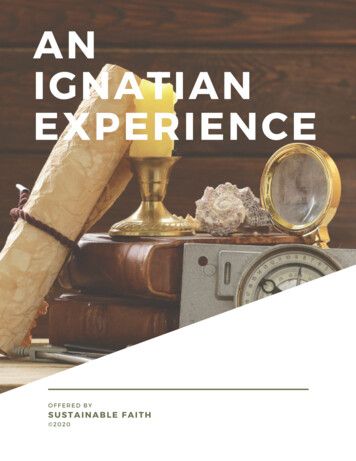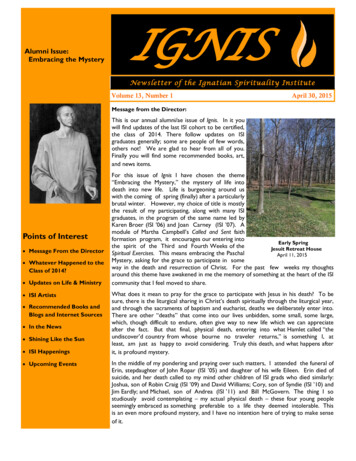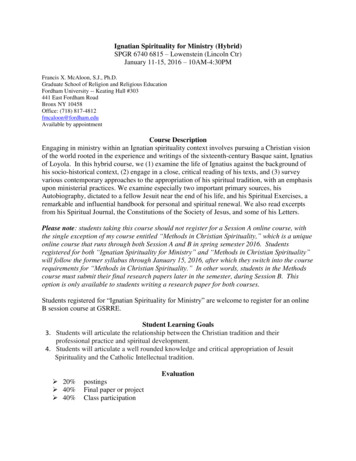
Transcription
Ignatian Spirituality for Ministry (Hybrid)SPGR 6740 6815 – Lowenstein (Lincoln Ctr)January 11-15, 2016 – 10AM-4:30PMFrancis X. McAloon, S.J., Ph.D.Graduate School of Religion and Religious EducationFordham University -- Keating Hall #303441 East Fordham RoadBronx NY 10458Office: (718) 817-4812fmcaloon@fordham.eduAvailable by appointmentCourse DescriptionEngaging in ministry within an Ignatian spirituality context involves pursuing a Christian visionof the world rooted in the experience and writings of the sixteenth-century Basque saint, Ignatiusof Loyola. In this hybrid course, we (1) examine the life of Ignatius against the background ofhis socio-historical context, (2) engage in a close, critical reading of his texts, and (3) surveyvarious contemporary approaches to the appropriation of his spiritual tradition, with an emphasisupon ministerial practices. We examine especially two important primary sources, hisAutobiography, dictated to a fellow Jesuit near the end of his life, and his Spiritual Exercises, aremarkable and influential handbook for personal and spiritual renewal. We also read excerptsfrom his Spiritual Journal, the Constitutions of the Society of Jesus, and some of his Letters.Please note: students taking this course should not register for a Session A online course, withthe single exception of my course entitled “Methods in Christian Spirituality,” which is a uniqueonline course that runs through both Session A and B in spring semester 2016. Studentsregistered for both “Ignatian Spirituality for Ministry” and “Methods in Christian Spirituality”will follow the former syllabus through January 15, 2016, after which they switch into the courserequirements for “Methods in Christian Spirituality.” In other words, students in the Methodscourse must submit their final research papers later in the semester, during Session B. Thisoption is only available to students writing a research paper for both courses.Students registered for “Ignatian Spirituality for Ministry” are welcome to register for an onlineB session course at GSRRE.Student Learning Goals3. Students will articulate the relationship between the Christian tradition and theirprofessional practice and spiritual development.4. Students will articulate a well rounded knowledge and critical appropriation of JesuitSpirituality and the Catholic Intellectual tradition.Evaluation 20% 40% 40%postingsFinal paper or projectClass participation
GradingWith all written submissions (including the final), “A” paper: submitted by the due-date and superior in content, composition, style, and themechanics of American academic English. Submission evinces an advanced engagementwith and integration of course materials. “B” paper: submitted by the due-date and excellent to above average in content,composition, style, and the mechanics of American academic English. Submissionevinces a high-level of engagement with and integration of course materials. Anotherwise superior submission receives a “B” when it is turned in past its due-date. “C” paper: submitted on time or past due and one (or more) aspects of its content,composition, style and mechanics of American academic English do not meet graduatelevel standards. Submission evinces adequate engagement with and integration of coursematerials. Generally speaking, graduate programs eschew grades of “D” or “F.” At the MA andDMin level, students are held to a higher standard than undergraduates. A failing grade,typically, is earned when a student does not complete at least 70% of course requirementswith a passing grade. Students with learning disabilities must follow university protocols for extensions, etc.Course Requirements Complete required readings as assigned. During the intensive week of daily classes,it is acknowledged that students may need to skim through some of the requiredreadings, with the understanding that either before or after the week of classes,students will complete unfinished reading. Post all written assignments as assigned. Attend and actively participate in all class sessions. [Absence policy: given theintensive nature of a hybrid course, students must attend all class sessions Mondaythrough Friday. An absence for part of one day will negatively affect one’s finalgrade. Students absent for a full day of class should withdraw from the course.] Collaborate in small groups to discuss course materials – both online and in class. Final paper or project on a topic in Ignatian Spirituality (the equivalent of 15-20pages, double-spaced, 12 point font, 1-inch margins, standard academic Englishgrammar, etc., bibliography included). Due February 29, 2016:o Research Paper: In consultation with and approval of the professor, choose aresearch project on some aspect of Ignatian spirituality. Confer by email withthe professor on your research topic during the weeks following class(January 2016). [SLG 3&4] Please Note: with the permission of the professor,students also registered for 2016 spring semester online “Methods in ChristianSpirituality” may write one research paper for both courses. For furtherdetails, see the note at the beginning of this syllabus.o Pastoral Project: In consultation with and approval of the professor, choose apastoral project and format in which you explore and explain both the theoryand practice of Ignatian spirituality. This consultation should occur duringthe month of January 2016. Whatever delivery method you select, e.g.,2
lecture, preaching, or other media, you must include ample footnoting ofyour material, referencing primary and secondary resources in Ignatianspirituality – these are for your professor, not your audience. Depending onyour medium, the length of your project is equivalent to 15-20 typewrittenpages. [SLG 3&4] (n.b., the “Pastoral Project” option is not available tostudents also registered for Methods in Christian Spirituality.) Some possibleprojects: Prepare one or two lectures (totaling 15-20 pages) on Ignatianspirituality for presentation to a ministerial peer group, e.g., diocesanclergy gathering (priests and/or permanent deacons), in-service dayfor chaplains (hospital, prison, college, or high school), parishleadership team, or the like. For the purposes of this project, you willassume that your intended audience is a group of maturing Christianswho actively live their faith (daily prayer, faith communityparticipation, regular spiritual direction, etc.) and who would likelyqualify as “second week” Christians according to Ignatius’ rules for thediscernment of spirits in other words, not introductory lecture(s).Your intended audience may be new to Ignatian spirituality, but yourlisteners enjoy a well developed sense of spirituality, self-knowledge,and religious practice. Please include footnotes and bibliography withthe lecture(s) – even though you wouldn’t deliver these citationswhen you lecture. Create a PowerPoint, YouTube video, or website on Ignatianspirituality, covering such topics as the Autobiography of Ignatius ofLoyola, the examen prayer, Ignatian contemplation, the SpiritualExercises, the rules for the discernment of spirits, the election(discerning God’s will), and the like. Create your own syllabus for a course in Ignatian spirituality that youintend to teach at a seminary or institute for the education of layecclesial ministers. Propose you own project!Required TextsGallagher, Timothy M. The Examen Prayer: Ignatian Wisdom for Our Lives Today. New York:Crossroad, 2006. ISBN: 9780824523671Ganss, George E. ed. Ignatius of Loyola: The Spiritual Exercises and Selected Works. TheClassics of Western Spirituality, ed. Bernard McGinn. Mahwah, NJ: Paulist, 1991. ISBN:0809132168.Lonsdale, David. Eyes to See, Ears to Hear: An Introduction to Ignatian Spirituality. Traditionsof Christian Spirituality, Philip Sheldrake, series ed. Maryknoll: Orbis Books, 2000.ISBN: 1-57075-336-9Traub, S.J., George W., ed. An Ignatian Spirituality Reader: Contemporary Writings on St.Ignatius of Loyola, the Spiritual Exercises, Discernment, and More. Chicago: LoyolaPress, 2008. ISBN: 0829427236.3
Recommended Texts(For personal enrichment; not required for this course.)Barry, SJ, William A. Finding God in All Things: A Companion to the Spiritual Exercises of St.Ignatius. Notre Dame, IN: Ave Maria Press, 1991 [Reprint of 1973 edition] ISBN: 9780877934608 [Any of Barry’s books is a good read.]Burke, Kevin R. and Eileen Burke-Sullivan, eds. The Ignatian Tradition, vol. in Spirituality inHistory, ed. Phyllis Zagano. Collegeville, MN: The Liturgical Press, 1909. ISBN:9780814619131Haight, Roger, Christian Spirituality for Seekers: Reflections on the Spiritual Exercises ofIgnatius Loyola. Maryknoll: Orbis, 2012. ISBN: 978-1-57075-987-1Fleming, SJ, Donald L. What is Ignatian Spirituality? Chicago: Loyola Press, 2008. ISBN:9780829427189 [Any of Fleming’s books is a good read.]Gallagher, Timothy M. The Discernment of Spirits: An Ignatian Guide for Everyday Living. NewYork: Crossroad, 2005. ISBN: 0824522915. An Ignatian Introduction to Prayer: Scriptural Reflections According to the SpiritualExercises. New York: Crossroad, 2008. ISBN: 9780824523671. Meditation and Contemplation: An Ignatian Guide to Praying with Scripture. NewYork: Crossroad, 2008. ISBN: 978-0824524883. Spiritual Consolation: An Ignatian Guide for the Greater Discernment of Spirits.New York: Crossroad, 2007. ISBN: 9780824524876Modras, Ronald. Ignatian Humanism: A Dynamic Spirituality for the 21st Century. Chicago:Loyola Press, 2004. ISBN: 9780829419863Worcester, Thomas, ed. The Cambridge Companion to the Jesuits. Cambridge: CambridgeUniversity Press, 2008. ISBN: 9780521857314Recommended Web Resources atian links.asp4
Schedule of Topics and AssignmentsPre-Class ReadingAppreciating that many students taking this course are also taking Dr. Beaudoin’s courseduring the first week of January 2016, students are encouraged to complete the followingreadings sometime during November-December 2015 or the weekend of January 9-10. Read Gallagher's The Examen Prayer in its entirety and practice the prayer form.o As you read this text, please integrate this prayer practice into your dailyprayer. It may take a little getting used to, but Gallagher does a good job ofintroducing it. I encourage you to keep a sort of examen prayer journal, sothat when we meet for our first class, you will have recollection of yourpractice with the prayer form. Please give the examen at least one week trybefore our first class. Our discussion in class will not concern the CONTENTof your examen, which is confidential, but with your EXPERIENCE of theexamen prayer practice itself. Please come to class with your questions,comments, and critiques. I will not read your journal and it is not a part ofyour semester grade. Recommended reading in The Ignatian Spirituality Reader, Ron Hansen’s essayentitled “The Pilgrim: Saint Ignatius of Loyola,” (pp. 24-44).Monday, January 11, 2016 – Introduction to Ignatius of Loyola and the Examen Read in George E. Ganss, ed., Ignatius of Loyola: The Spiritual Exercises and SelectedWorks, Ignatius’ “Autobiography” (pages 65-111).Based on this reading, post to Blackboard your responses to each of the following questions:(1) what did you find inspiring, enlightening, or attractive? (2) What did you findtroubling, unattractive, or objectionable? (3) What applications does Ignatius’spirituality have in our lives today? [SLG 3&4]Read in Lonsdale's EYES TO SEE, EARS TO HEAR, chapters 1, 2, & 3 (pages 36-88).Based on your reading of these pages, please come to class with your questions,comments, and critiques of Lonsdale's presentation.Recommended reading: in Ganss, “General Introduction” (pages. 10-63).Tuesday, January 12, 2016 – Ignatian Prayer Read in Lonsdale, EYES TO SEE, EARS TO HEAR, pages 110-125, 142-154. Sometimebetween Monday afternoon and Tuesday morning, please experiment with prayingthe Ignatian contemplation on the Nativity (pages. 112-113).Read in Traub, AN IGNATIAN SPIRITUALITY READER, the sections entitled “FindingGod in All Things” and “Prayer” (pp. 48-113).Come to class prepared to critically engage the material read. Students take turnsleading the discussion on articles. Students take turns leading the discussion onarticles.5
Wednesday, January 13, 2016 – The Spiritual Exercises: Background and Weeks 1-2 Read in Ganss, IGNATIUS OF LOYOLA, pages 113-160, selections from The SpiritualExercises.Read in Lonsdale, EYES TO SEE, EARS TO HEAR, pages 126-141.Read in Traub, AN IGNATIAN SPIRITUALITY READER, pages 116-150.Come to class prepared to critically engage the material read. Students take turnsleading the discussion on articles.Thursday, January 14, 2016 – The Spiritual Exercises: Weeks 3-4; Discernment ofSpirits Ganss, IGNATIUS OF LOYOLA, pages 161-207 (skim through pages 178-200), TheSpiritual Exercises.Lonsdale, EYES TO SEE, EARS TO HEAR, pages 89-109.Traub, AN IGNATIAN SPIRITUALITY READER, pages 152-222.Come to class prepared to critically engage the material read. Students take turnsleading the discussion on articles. Students take turns leading the discussion onarticles.Friday, January 15, 2016 – Discernment of God’s Will Ganss, IGNATIUS OF LOYOLA, pages 160-166.Traub, AN IGNATIAN SPIRITUALITY READER, pages 4-17, 224-269.TBAJanuary 16-31, 2016, students communicate by email with the professor to propose,develop, and commit to a definitive final research paper or project topic.February 15, 2016, deadline for students to post on blackboard a draft outline of theirpaper/project.February 22, 2016, deadline for students to post a draft of the introduction (or itsequivalent) to their paper/project.February 29, 2016, deadline for students to post on blackboard the final version of theirpaper/project.November 11, 2015Draft subject to change before January 11, 20166
the Ignatian contemplation on the Nativity (pages. 112-113). Read in Traub, AN IGNATIAN SPIRITUALITY READER, the sections entitled “Finding God in All Things” and “Prayer” (pp. 48-113). Come to class prepared to critically engage the material read. Students take turns leading the discussion on articles.File Size: 806KB
